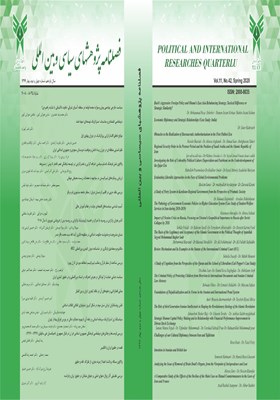قصد در حقوق ایران و انگلیس
محورهای موضوعی : مجله پژوهش های سیاسی و بین المللیسمیه رحمانی 1 , حمید رضا قاسمی 2
1 -
2 -
کلید واژه: اراده, قصد, اکراه, رضا, قصد انشا,
چکیده مقاله :
سمیه رحمانی[1]- حمید رضا قاسمی[2] تاریخ دریافت: 22/8/1398- تاریخ پذیرش: 1/9/1398 چکیده: هدف از انتخاب این موضوع شناخت مفهوم اراده و اشتراکات و تفاوتهای آن در حقوق ایران و انگلیس می باشد که به روش توصیفی و تحلیلی به دنبال پاسخ به سوال قصد واراده چیست و تفاوتهای قصدواراده درحقوق ایران و انگلیس در چیست ؟ فرضیه آن اینست که با بررسی قصد و رضا و جوانب و مراحل قصد در ایجاد عمل حقوقی نه تنها یه شناخت مفهوم اراده مراحل شکل گیری آن واقف تر می شویم بلکه بهتر به انواع آن در حقوق ایران و انگلیس نیز می پردازیم. اراده در لغت به معنی خواستن، قصد کردن میباشد. در اصطلاح حقوق ایران نیز میتوان اراده را به خواستن معنی کرد. منتها هنگامی که از شرط روانی معامله یا ایقاع کننده در حقوق ایران بحث به میان میآید، براساس تحلیلی که از حالات روانی و مراحل مختلف آن به استناد مقررات قانونی به عمل میآید، برای اراده یا خواستن دو حالت جداگانه درونی شناخته میشود. یکی رضا و دیگری قصد که از آن به قصد انشاء تعبیر شده است برای تحقق هر عمل حقوقی، قصد انشا ضروری است. در این نوشته سعی شده است در هر مبحث دیدگاه های عامـه(حقوقدانان ) ایران و انگلیس را بررسی و تبیین شود. [1] - دانشجوی کارشناسی ارشد، حقوق خصوصی، دانشکده حقوق و علوم سیاسی، واحد تاکستان، دانشگاه آزاداسلامی ، قزوین، ایران prsrahmanim@gmail.com [2] - استادیار و عضو هیئت علمی، گروه حقوق، دانشکده حقوق و علوم سیاسی، واحد تاکستان، دانشگاه آزاداسلامی، قزوین، ایران: نویسنده مسئول
Somayeh Rahmani[1] Hamid Reza Ghasemi[2] Abstract: The purpose of choosing this topic is to understand the meaning of the will and its differences and commonalities in Iranian and British law, which is a descriptive and analytical method to answer the question of the questions and what are the differences between the Iranian and British law? It is a hypothesis that, by reviewing intention and consent, and the pros and stages of intention create legal action, it is not only to recognize the concept of the will of its formation, but also to be better in the Iranian and British law. The will in the word means to ask for it. In the so - called Iranian law, it can also be called will. The will in the word means to ask for it. In the so - called Iranian law, it can also be called will. Therefore, when discussing the psychological condition of transaction in the Iranian law, it is based on the analysis that comes from mental states and its various stages as legal rules, for the will or the will of two separate internal states. One is consent and the other is the intention, which is interpreted as the intention to write. In order to fulfill any legal act, the intention to write is necessary. In this article, an attempt has been made to examine and explain the general views (of jurists) of Iran and Britain in each issue [1] - M.Sc. Student, Private Law, Faculty of Law and Political Science, Takestan Branch, Islamic Azad University, Qazvin, Iran [2] - Assistant Professor and Faculty Member, Department of Law, Faculty of Law and Political Science, Takestan Branch, Islamic Azad University, Qazvin, Iran: Corresponding Author
_||_


